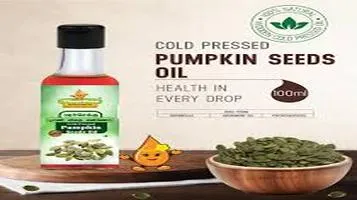Pumpkin Seed Oil – A Nutritional Powerhouse and Culinary Delight
Pumpkin seed oil, derived from the seeds of the Cucurbita pepo pumpkin, is a versatile and nutrient-rich oil renowned for its distinctive dark green color and nutty flavor. Rich in essential fatty acids, vitamins, and minerals, this oil offers numerous health benefits. It contains a high concentration of antioxidants, including vitamin E and carotenoids, which contribute to its anti-inflammatory and heart health properties. Additionally, pumpkin seed oil is celebrated for its potential to support prostate health, improve urinary function, and enhance skin and hair vitality. Commonly used in culinary applications, it adds a unique flavor to salads, soups, and dressings. Its nutritional profile and health-promoting qualities make pumpkin seed oil a valuable addition to a balanced diet.

Pumpkin seed oil, a dark green to amber-colored oil extracted from the seeds of pumpkins, has been gaining popularity not only for its unique flavor but also for its impressive array of health benefits. Originally a staple in Eastern European and Austrian cuisine, it has now found its way into kitchens and health food stores around the globe. This review delves into the various aspects of pumpkin seed oil, including its nutritional profile, culinary uses, health benefits, and potential drawbacks.
Nutritional Profile
One of the most compelling reasons to incorporate pumpkin seed oil into your diet is its rich nutritional profile. The oil is packed with essential fatty acids, particularly omega-6 (linoleic acid) and omega-9 (oleic acid), which are crucial for maintaining healthy cell membranes and promoting cardiovascular health. Additionally, pumpkin seed oil is a good source of vitamins A, E, and K. Vitamin E, in particular, acts as a powerful antioxidant, protecting cells from oxidative stress and potentially reducing the risk of chronic diseases.
Moreover, pumpkin seed oil contains a variety of minerals, including magnesium, zinc, and iron. Magnesium plays a vital role in over 300 enzymatic reactions in the body, while zinc is essential for immune function and wound healing. Iron is crucial for the production of hemoglobin, which transports oxygen throughout the body. The presence of these nutrients makes pumpkin seed oil a valuable addition to a balanced diet.
Culinary Uses
Pumpkin seed oil has a distinctive, nutty flavor that can enhance a variety of dishes. It is often used as a finishing oil rather than a cooking oil due to its low smoke point. Drizzling it over salads, soups, roasted vegetables, or even ice cream can add a unique and delightful taste. In Austrian cuisine, it is commonly used as a dressing for Styrian potato salad and as an ingredient in pumpkin soup.
The oil’s rich, robust flavor pairs well with both sweet and savory dishes. For instance, it can be mixed with balsamic vinegar to create a flavorful salad dressing or blended into hummus for an added depth of flavor. Its versatility in the kitchen makes it a favorite among chefs and home cooks alike.
Health Benefits
The health benefits of pumpkin seed oil are numerous and well-documented. Here are some of the key advantages:
1. Prostate Health: Pumpkin seed oil has been shown to support prostate health. It contains phytosterols, compounds that have been found to reduce symptoms of benign prostatic hyperplasia (BPH), a common condition in older men.
2. Heart Health: The oil’s high content of unsaturated fats, particularly omega-6 and omega-9 fatty acids, helps reduce bad cholesterol levels (LDL) while increasing good cholesterol levels (HDL). This can lower the risk of cardiovascular diseases.
3. Anti-Inflammatory Properties: The antioxidants and essential fatty acids in pumpkin seed oil have anti-inflammatory properties that can help alleviate conditions like arthritis and other inflammatory diseases.
4. Skin and Hair Health: The vitamins and minerals in pumpkin seed oil contribute to healthy skin and hair. Vitamin E, in particular, helps maintain skin elasticity and hydration, while zinc supports hair growth and reduces dandruff.
5. Urinary Health: Studies have indicated that pumpkin seed oil can improve bladder function and reduce symptoms of overactive bladder in both men and women.
Potential Drawbacks
While pumpkin seed oil offers numerous benefits, it is essential to be aware of potential drawbacks. The oil is calorie-dense, with about 120 calories per tablespoon, so it should be used in moderation, especially for those watching their caloric intake. Additionally, its low smoke point means it is not suitable for high-heat cooking methods, which limits its culinary applications.
Another consideration is the cost. High-quality, cold-pressed pumpkin seed oil can be relatively expensive compared to other oils. However, given its nutritional benefits and rich flavor, many find it to be a worthwhile investment.
Conclusion
Pumpkin seed oil is a nutritional powerhouse with a unique flavor profile that can elevate a variety of dishes. Its rich content of essential fatty acids, vitamins, and minerals makes it a valuable addition to any diet. The health benefits, ranging from improved prostate and heart health to anti-inflammatory and skin-nourishing properties, further underscore its appeal.
However, it is essential to use pumpkin seed oil in moderation due to its caloric density and to be mindful of its cost. As with any dietary supplement, it is advisable to consult with a healthcare provider, especially if you have any underlying health conditions or are taking medication.
Overall, pumpkin seed oil is a versatile and healthful oil that deserves a place in your pantry. Whether drizzled over a salad or blended into a dressing, its nutty flavor and nutritional benefits are sure to make it a cherished staple in your culinary repertoire.






